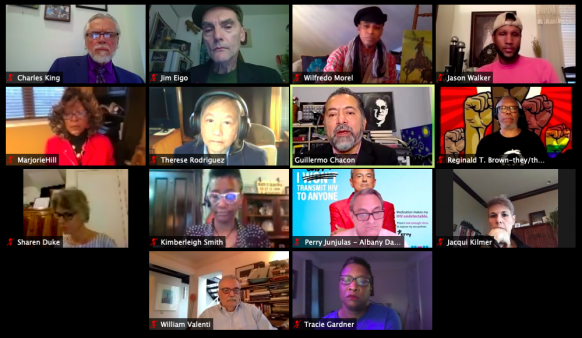On the eve of World AIDS Day, HIV leaders across New York state demanded that Governor Andrew Cuomo not abandon his commitment to the Ending the Epidemic Blueprint. Specifically, they urge the state not to implement a 20% across-the-board withholding of funding for HIV programs and not to cut nearly $60 million from 340B safety net funds and pharmacy rebates.
A roster of advocates held a Zoom press conference led by Charles King, the CEO of Housing Works, which fights the dual epidemics of HIV and homelessness (you can watch the full press conference on Vimeo; below is a promo for the event).
View this post on Instagram
King noted that Cuomo, who endorsed much of the Ending the HIV/AIDS Epidemic plan in 2015, has been an ally in fighting HIV. In recent years, his administration’s efforts have led to many improvements. In fact, in October 2019, Cuomo announced that the Empire State was on track to end AIDS by 2020, meaning that there would be 750 or fewer new HIV infections per year, thanks to fewer (and earlier) HIV diagnoses, better linkage to care, and more people taking PrEP (pre-exposure prophylaxis to prevent HIV).
However, the advocates maintain, Cuomo’s commitment is wavering. “The same community health organizations who collaborated with Governor Cuomo’s administration to create the [Ending the Epidemic] Blueprint are now in an impossible, untenable position,” King said.
As we observe #WorldAIDSDay, Ryan Health has serious concerns regarding the negative impacts of the state’s pharmacy benefit carve out plan on vulnerable populations, including those living with HIV or at-risk for HIV. @HealthNYGov @NYS_DOB #WAD2020 #DontCutTheNet pic.twitter.com/wq5X30fazE
— Ryan Health (@RyanHealthNYC) November 30, 2020
“The governor,” King continued, ”is making moves to destroy the very safety net that must be preserved to get us to truly ending the epidemic in New York state and refuses to implement key interventions that require a proven, harm reduction approach. We call upon him at this crucial juncture to make good on his promises, trust the experts and do everything within his power to continue funding the hundreds of providers that will be irrevocably harmed by the proposed 340B cuts.” King added that the cuts are expected to take effect April 1, 2021.
340B refers to a drug pricing program and safety net service that helps health care providers obtain meds and offer wraparound services at discount prices. If these savings are lost, advocates say, the poorest and most at risk in New York will be affected—notably, Black and brown communities and immigrants. Not only will the cost of drugs increase, but services such as food pantries and health clinics will close.
What’s more, King said, the governor has failed to adapt two of the ending the epidemic goals: to expand housing for homeless with HIV outside New York City and to expand overdose prevention services to address the opioid crisis and prevent new HIV and hepatitis C infections.
.@NYGovCuomo #DontCutTheNet! https://t.co/DfZ8lF6ztm
— Housing Works (@housingworks) November 30, 2020
“For Ryan White clinics, the proposal would result in a significant step backward in the NYS fight to end the HIV/AIDS epidemic,” said Andrea DeMeo, the president and CEO of Trillium Health. “The reduction of 340B savings would threaten comprehensive services for our patients living with HIV and prevention work in our community to stop the spread of the virus. It will also undermine our success in addressing health disparities, particularly within communities of color. And the timing couldn’t be any worse, as COVID-19 has disproportionately affected the vulnerable communities that we serve. We ask the governor to reverse his decision so we may continue to provide the highest quality of care and services to end the HIV epidemic as we fight the pandemic of COVID-19.”
“The pharmacy carve-out and the continuation of the 20% holdback will decimate the safety net system at a time when the system is in even more demand,” added Jacquelyn Kilmer, CEO of Harlem United. “Communities that remain most impacted by HIV are the very communities that are now hardest hit by the COVID-19 pandemic. The very programs and services that have allowed us to make progress in ending the epidemic and are critical to continuing that progress are the ones that will be lost. The very providers who have been, and remain, on the front lines of caring for those living with and most at risk for HIV, and now COVID-19, are the ones that will be forced to reduce services or close their doors altogether. The State cannot balance the budget on the backs of the safety net system and the communities that rely on it.”
For more details about the virtual conference, see this Housing Works press release.







1 Comment
1 Comment